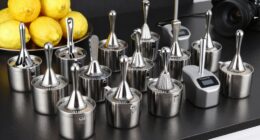Beet juice typically stays active in your system for about six hours after you drink it. During this time, it can effectively lower blood pressure and enhance exercise performance. The nitrates in beet juice convert to nitric oxide, improving blood flow. However, individual responses may vary, so tracking how it affects you personally is helpful. If you're curious about maximizing the benefits and knowing more about timing and consumption, there's plenty more to explore.
Key Takeaways
- Beet juice effects on blood pressure are felt within three hours and last for about six hours post-consumption.
- Nitrate levels from beet juice return to baseline within 12 to 24 hours after intake.
- Regular consumption over at least 60 days is recommended for sustained benefits.
- Individual responses to beet juice can vary based on health status and digestive transit times.
- Urine may turn reddish after consumption, indicating nutrient absorption but posing no health risks.

When you drink beet juice, you might wonder how long its benefits last in your body. Beet juice is renowned for its ability to lower blood pressure, thanks to its high nitrate content. When you consume beet juice, your body converts these nitrates into nitric oxide, a compound that helps relax and widen blood vessels, leading to reduced blood pressure. You'll typically feel the effects within about three hours. This means if you're looking to manage your blood pressure effectively, timing your consumption can be crucial.
The blood pressure-lowering effects of beet juice can last approximately six hours after you drink it. However, the nitrates in your system will return to baseline levels within 12 to 24 hours. That said, if you’re relying on beet juice for hypertension management, regular consumption is key. Experts recommend incorporating beet juice into your diet for at least 60 days to see significant improvements in blood pressure. It’s a commitment, but the potential health benefits are well worth it. To maximize the benefits of beet juice, it’s essential to understand how to store beet juice properly. Freshly juiced beets should be consumed within 24 hours for the best effect, but if you need to store it, keep the juice in an airtight container in the refrigerator to maintain its nutritional quality. Additionally, consider freezing smaller portions for longer-term storage, ensuring you can enjoy the cardiovascular benefits of beet juice even on busy days.
Another area where beet juice shines is exercise performance. If you're planning a workout, drinking beet juice two to three hours beforehand can give you a performance boost. The nitrates convert to nitric oxide, enhancing blood flow and oxygen delivery to your muscles during exercise. This means you might notice improved stamina and reduced fatigue, allowing you to push yourself a little harder in your workouts.
However, just like with blood pressure, the effects won't last forever. You'll likely feel the benefits peak around that three-hour mark, so timing your intake is essential if you want to maximize your performance.
It's important to remember that the duration of beet juice's effects can vary among individuals. Factors such as your overall health status and individual digestive transit times play a significant role. For some, the benefits might last longer or be more pronounced, while for others, the effects might fade more quickly. This variability means that it's useful to pay attention to how your body responds to beet juice. Keeping track of your experiences can help you figure out the best routine for you.
If you're considering adding beet juice to your daily regimen, be prepared for some changes in your urine color. The pigments in beets can cause a reddish hue, particularly after consuming beet juice, but this is harmless. It's just a sign that the nutrients are working their way through your system.
Frequently Asked Questions
How Long Does It Take for Beets to Clear Your System?
When you consume beets, it generally takes about 24 to 48 hours for them to clear from your system.
Your body absorbs nitrates within 2-3 hours, and the pigments can change your urine and stool color for up to 48 hours.
Individual digestion rates and health can affect this timeline, so you might notice variations.
If you regularly eat beets, their effects may last longer in your body.
Keep that in mind!
How Long Do the Effects of Beet Juice Last?
Ever wondered how long the benefits of beet juice actually stick around?
After drinking it, you'll likely feel its effects on blood pressure within about 3 hours, lasting for roughly 6 hours.
For more significant improvements, regular daily intake over 60 days is key.
Keep in mind, your body might clear the nitrates in 12-24 hours, and individual responses can vary based on your health and diet.
Can You See Beet Juice in Your Stool?
Yes, you can see beet juice in your stool after consuming it. The pigment betanin in beets often causes a reddish or pinkish hue, which can appear within 12 to 24 hours.
This color change usually lasts up to 48 hours, depending on your digestive health and fiber intake.
If you notice persistent discoloration without recent beet consumption, it's a good idea to consult your healthcare provider to check for other issues.
Is There a Downside to Drinking Beet Juice?
You might be surprised to learn that beet juice isn't all sunshine and rainbows.
While it offers health benefits, there are downsides to consider. Drinking too much can lead to beeturia, turning your urine pink or red—harmless but shocking!
It also contains high oxalates, which could increase kidney stone risk. If you're sensitive to FODMAPs, prepare for potential bloating and cramps.
And don't forget about rare allergic reactions that can occur!
Conclusion
In the vibrant dance of your bloodstream, beet juice weaves its magic, bringing a burst of energy and color to your day. You might feel its effects for up to 24 hours, a fleeting yet powerful reminder of nature's vitality. Imagine those ruby-red droplets swirling through you, igniting your muscles and sharpening your focus. As the sun sets, the remnants fade, but the invigorating essence lingers, nudging you to embrace the next sip of health.
Cindy thoroughly researches juicing trends, techniques, and recipes to provide readers with practical advice and inspiration. Her writing style is accessible, engaging, and designed to make complex concepts easy to understand. Cindy’s dedication to promoting the advantages of juicing shines through her work, empowering readers to make positive changes in their lives through the simple act of juicing.











